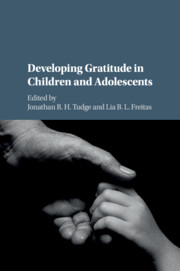Book contents
- Developing Gratitude in Children and Adolescents
- Developing Gratitude in Children and Adolescents
- Copyright page
- Dedication
- Contents
- Figures
- Tables
- Contributors
- Acknowledgments
- 1 Developing Gratitude
- Part I Setting the Scene
- Part II Gratitude, Developing
- 4 Assessing Influences on Gratitude Experience
- 5 Gratitude and Moral Obligation
- 6 Cross-Cultural Variations in the Development of Gratitude
- 7 Gratitude in Adolescence
- 8 The Development of Gratitude and Its Relation to Spending Preferences and Materialism
- Part III Developing Gratitude
- Index
- References
5 - Gratitude and Moral Obligation
from Part II - Gratitude, Developing
Published online by Cambridge University Press: 07 December 2017
- Developing Gratitude in Children and Adolescents
- Developing Gratitude in Children and Adolescents
- Copyright page
- Dedication
- Contents
- Figures
- Tables
- Contributors
- Acknowledgments
- 1 Developing Gratitude
- Part I Setting the Scene
- Part II Gratitude, Developing
- 4 Assessing Influences on Gratitude Experience
- 5 Gratitude and Moral Obligation
- 6 Cross-Cultural Variations in the Development of Gratitude
- 7 Gratitude in Adolescence
- 8 The Development of Gratitude and Its Relation to Spending Preferences and Materialism
- Part III Developing Gratitude
- Index
- References
- Type
- Chapter
- Information
- Developing Gratitude in Children and Adolescents , pp. 89 - 110Publisher: Cambridge University PressPrint publication year: 2017



